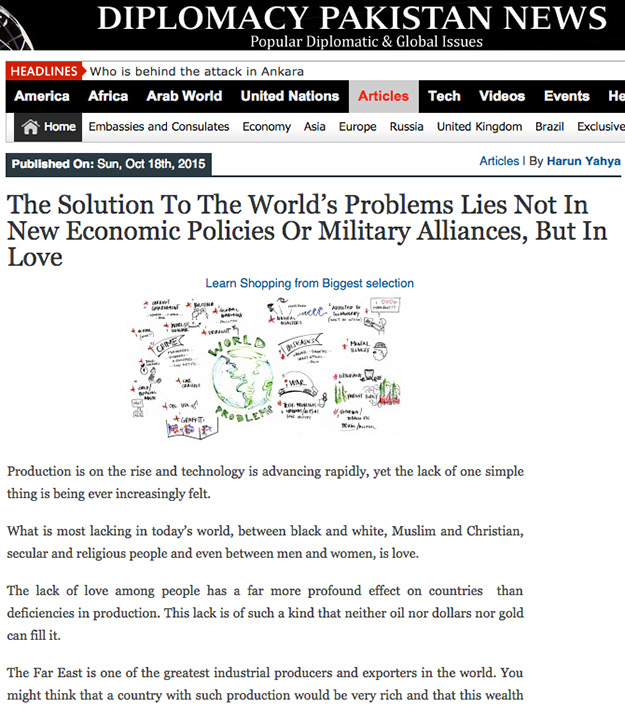
Production is on the rise and technology is advancing rapidly, yet the lack of one simple thing is being ever increasingly felt.
What is most lacking in today’s world, between black and white, Muslim and Christian, secular and religious people and even between men and women, is love.
The lack of love among people has a far more profound effect on countries than deficiencies in production. This lack is of such a kind that neither oil nor dollars nor gold can fill it.
The Far East is one of the greatest industrial producers and exporters in the world. You might think that a country with such production would be very rich and that this wealth would bring well-being and happiness to its people. The truth of the matter, however, is very different. A system focused on production alone also results in great pressure and injustice, and thus in unhappiness.
Not only in the Far East, in many other parts of the world workers are not compensated for the full measure of their labor. Furthermore, in certain workplaces, children are preferred as laborers as they cannot demand their fair share – and it's also far easier to put them to work with much lower salaries. These child laborers with no social security are forced to work very hard under harsh working conditions, and are often brutally maltreated by owners of the business or managers.
There is multitude of child laborers put to work in African mines. Almost all of them have problems with shelter and nutrition. And in general there is not a single institution that would speak up for their rights in front of the mining companies with their giant capital.
These conditions are by no means limited to the boondocks or machine shops. Workers in a factory producing mobile phones and computers for the world’s best-known company work for 16 hours non-stop. Exhausted workers were filmed falling asleep in their seats. The brand in question had previously come to notice with the suicides of 14 workers at its biggest supplier.
These conditions, which represent examples of ruthlessness - and even outright cruelty - stem from lovelessness. Managers smother their consciences almost entirely for the sake of earning more or making a good impression on their own bosses. Judges deprived of love for people lose their capacity to rule with justice at courts. Teachers who are not affectionate toward their students cannot educate those kids as needed. Doctors lacking feelings of compassion and love no longer seek a meaningful and successful recovery for their patients, but regard them as a means of earning their living. Even though this makes no headlines in the media, official governmental services may even come to a halt due to lovelessness. In all those stories about doctors with no mercy for their patients, or teachers tormenting their students there is not a single comment saying that “if they had adequate love for one another, and could show compassion and interest, none of this would occur.” Nations do not also emphasize the vitality of love for their people and only strive to maintain minimal living conditions.
When the past is pondered, love is the most urgent requirement for people to be at peace and in happiness. The results of a loveless life style can be seen quite obviously in authoritarian regimes based on ideological foundations. People in regimes such as Nazi Germany turned into automatons purged of any feelings of love, conscience, compassion, affection and solidarity, and easily became capable of mass murder due to the anger they felt toward different ideologies, beliefs or ethnic groups. There are many other instances of persecution due to lovelessness all over the world, though perhaps not on the horrific scale seen in Nazi Germany.
The deadly consequences of this lovelessness are today making themselves felt from Afghanistan to Libya in a wide area. For example, a major civil conflict broke out among Yemenis when love disappeared. Under the influence of radical ideas, people who speak the same language and believe in the same God and the same prophet are now ruthlessly slaughtering one another in Yemen.
Neither international organizations nor intermediaries or politicians are able to halt this veritable worldwide tsunami of blood and ongoing selfishness and wrongdoing. Nor can they prevent moral degeneracy and apathy: Events like National Hugging Day, celebrated every year on January 21st, stand as purely superficial reactions and fail to provide a solution to the conflicts and tensions between people.
The only way of eliminating social ills and conflicts is by strengthening the bonds of love among people and enhancing moral sensitivities. Nobody who heeds the voice of his conscience, who has strong feelings of love and compassion and is aware of the importance of mutual aid and sharing, can ever remain silent in the face of such a human drama and behave in an uncaring manner. The real problem, therefore, is the disappearance of love and the rise of moral cowardice and selfishness in the world.
Although societies collapsing and failing states are most frequently linked to political or economic factors, it is always the causes created by a lack of love that underlie the agents that trigger these factors. This causes a chain reaction in society and can ultimately provoke a severe social collapse. Once the element that unites a society, love in other words, has been weakened and dissolved, an economic or security issue will act like a rock hitting a fractured jar, completely shattering it.
Contrary to popular belief, considering love as the most important factor in establishing social cohesion is not a weakness. On the contrary, societies with powerful bonds of love among individuals have always been much stronger in the face of both internal and external destructive agents.
Adnan Oktar's piece on Diplomacy Pakistan:


